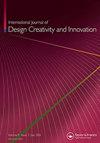虚拟现实设计与物理模拟构建测试游戏:研究设计认知的机会
IF 2.5
Q4 ENGINEERING, MANUFACTURING
International Journal of Design Creativity and Innovation
Pub Date : 2021-07-03
DOI:10.1080/21650349.2021.1929500
引用次数: 15
摘要
摘要增加研究设计认知的方法范围,为研究感兴趣的现象提供了新的机会。在这里,我们提出了一种观察设计活动的方法,使用内置物理模拟的虚拟现实(VR)设计-构建测试游戏。为了说明这一点,我们报道了两个探索性设计研讨会,其中两组参与者使用这样的平台来解决技术设计问题。参与者被要求勾勒出解决问题的想法,然后在VR游戏中设计、测试和迭代他们开发的一些设计概念。研究人员能够获得参与者在各种设计活动中行为的连续和多方面的记录。这包括屏幕上的设计活动、言语、身体姿势、设计输出的数字模型和测试结果的记录。我们在研讨会上的经验是关于类似的VR游戏平台为设计认知研究提供的机会进行讨论的,无论是在总体上还是在构思、原型设计、问题重构、内在动机和已证明的脆弱性方面。VR游戏平台不仅为现有的研究选择提供了宝贵的补充,而且还为开发设计教育和实践中的培训干预措施提供了基础。本文章由计算机程序翻译,如有差异,请以英文原文为准。
Virtual Reality design-build-test games with physics simulation: opportunities for researching design cognition
ABSTRACT Increasing the range of methods available for researching design cognition provides new opportunities for studying the phenomena of interest. Here we propose an approach for observing design activities, using Virtual Reality (VR) design-build-test games with built-in physics simulation. To illustrate this, we report on two exploratory design workshops where two groups of participants worked to solve a technical design problem using such a platform. Participants were asked to sketch ideas to solve the problem, and then to design, test and iterate some of their developed design concepts in a VR game. Researchers were able to obtain continuous and multifaceted recordings of participants’ behavior during the various design activities. This included on-screen design activities, verbal utterances, physical gestures, digital models of design outputs, and records of the test outcomes. Our experiences with the workshops are discussed with respect to the opportunities that similar VR game platforms offer for design cognition research, both in general and specifically in terms of ideation, prototyping, problem reframing, intrinsic motivation and demonstrated vulnerability. VR game platforms not only offer a valuable addition to existing research options, but additionally offer a basis for developing training interventions in design education and practice.
求助全文
通过发布文献求助,成功后即可免费获取论文全文。
去求助
来源期刊

International Journal of Design Creativity and Innovation
ENGINEERING, MANUFACTURING-
CiteScore
3.80
自引率
27.80%
发文量
15
期刊介绍:
The International Journal of Design Creativity and Innovation is an international publication that provides a forum for discussing the nature and potential of creativity and innovation in design from both theoretical and practical perspectives. Design creativity and innovation is truly an interdisciplinary academic research field that will interest and stimulate researchers of engineering design, industrial design, architecture, art, and similar areas. The journal aims to not only promote existing research disciplines but also pioneer a new one that lies in the intermediate area between the domains of systems engineering, information technology, computer science, social science, artificial intelligence, cognitive science, psychology, philosophy, linguistics, and related fields. The journal covers, but is not restricted to, the following topics: ·Theories on Design Creativity and Innovation ·Cognition of Design Creativity ·Innovative Process ·Inventive Process ·Analogical Reasoning for Design Creativity and Innovation ·Design Synthesis ·Method and Tools for Design Creativity and Innovation ·Representation of Design Creativity and Innovation ·Education for Design Creativity and Innovation ·Concept Generation and Inspiration.
 求助内容:
求助内容: 应助结果提醒方式:
应助结果提醒方式:


